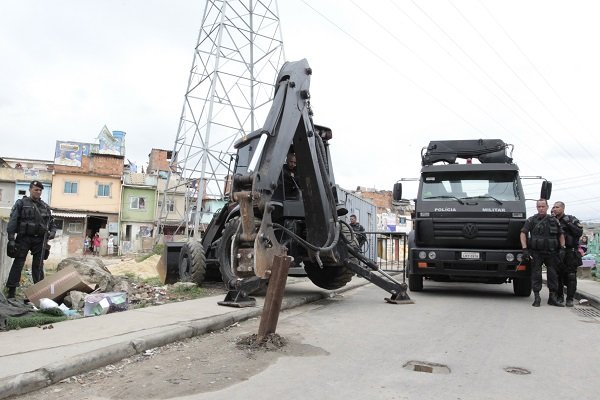On January 19th of 2021, 9 months after one of the most violent police operations that ever took place in Rio de Janeiro state, which resulted in 28 deaths, the state government started the implementation of a new law enforcement, urbanistic and social program – called Cidade Integrada – in the favela that was the stage of the violent operation, Jacarezinho, in the capital’s North Zone. The area was, and still is, controlled by drug traffickers.
To avoid criticism about the nature of its targets, Governor Cláudio Castro informed that the program would always be implemented in two places at the same time: one controlled by drug traffickers, and the other by militias. Thus, a few hours after the operation began in Jacarezinho, the police started to occupy, on the same day, the region of Muzema and its surroundings (Morro do Banco and Tijuquinha), in the West Zone.
In the first month of the program, more than 50 criminals were arrested, at least 1.000 kg of drugs were seized and 27 tons of debris that clogged Jacarezinho’s alleys were removed. The number of vehicle and street robberies has also dropped.
Many experts are concerned that Cidade Integrada may commit the same mistakes as the previous law enforcement and social services program which installed Pacifying Police Units – UPP in crime-controlled favelas between 2008 and 2013. According to the governor, the new project is different as there will be greater implementation of social and urban interventions than the previous one which focused on security.
UPP’S NEW FORMULA
The will to reformulate the UPP project had already been stated in May 2021 by the Governor Cláudio Castro. At the time, he criticized the previous program, saying that the state was not present enough, and that favelas did not have access to public services. In November, he laid out the new project: to occupy favelas with police forces that are able to patrol while investigating and dismantling criminal organizations, followed by urban and social interventions. Initially the program will be implemented in four other places besides Jacarezinho and Muzema: Cesarão, in Santa Cruz; Pavão-Pavaozinho/Cantagalo, in Copacabana and Ipanema; Complexo da Maré; and Rio das Pedras.
The list of interventions in Jacarezinho and Muzema is extensive and includes 6 themes: social, infrastructure, transparency, economy, governance, and security. It is worth mentioning that in Jacarezinho a police battalion with capacity for 400 agents will be installed at a cost of R$ 18 million, and that river channeling and urbanization works will be made for R$ 147 million. In addition, approximately 1.500 homes will be remodeled/built for R$ 141 million. In other places than Jacarezinho and Muzema, the interventions are not so clear yet, but some have already been announced. In Pavão-Pavãozinho/Cantagalo, the state will repair the access elevators to the building where the social company Viva Rio, the public school João Goulart and a technical university (Faetec) unit currently operate.
MAIN OBSTACLES
In Jacarezinho and Muzema, the occupation has already started, and the works are in progress. The results were positive, but some residents of Jacarezinho complained about police abuse and encouraged the creation of an independent organ called the “Cidade Integrada Observatory”, which is committed to monitoring the occupation and storing data that will allow a detailed analysis of the program.
The main critic, however, is the possibility that the model will make the same mistakes as the UPPs and fail. According to some experts, the biggest risks are: restricting residents’ freedom of movement; expansion without previously analyzing the territories; corruption; lack of social investment; loss of funding; and use of the program for political purposes.
WILL IT WORK?
Cidade Integrada is still at its first stage, it is thus too early to make incisive judgments. In theory, it seems that Claudio Castro has tried to orchestrate the new program having the causes of past failures in mind. Yet, there is a gap between designing a project and implementing it. Adaptations, exclusions and inclusions are constantly being made as the project unfolds and realities change. These changes can be both negative and positive. Another issue is that a change of government due to the 2022 elections may stop or change the initial project.
It is possible that the project will have a positive outcome in places where it is implemented and will then be expanded to other communities. These places should have increased levels of security, but the program, in a public safety context, cannot totally eliminate criminal activities and criminals have already migrated from Jacarezinho to other locations with less police presence.




